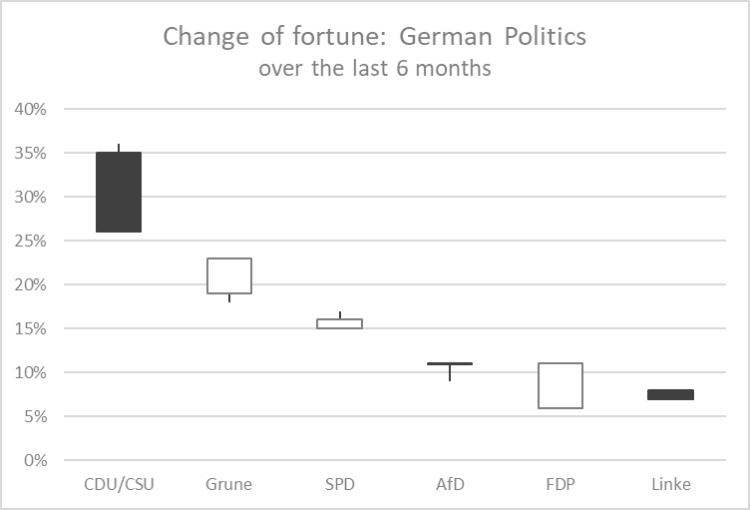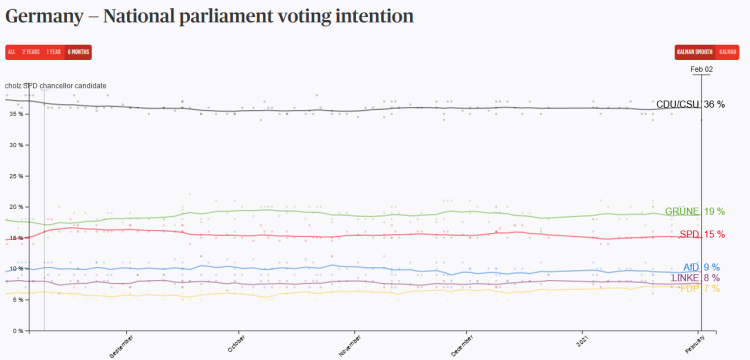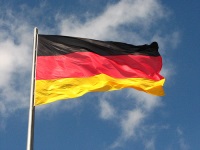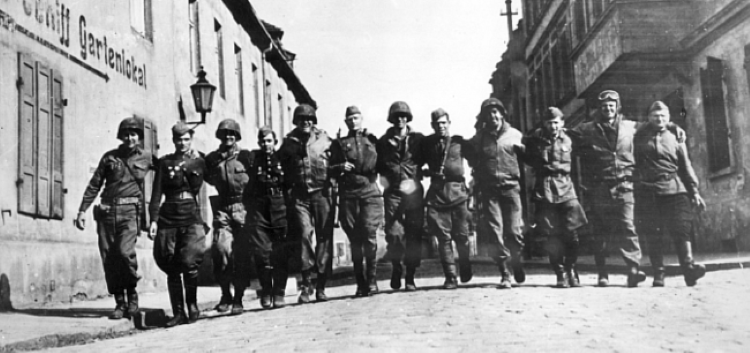In Germany, Die Grüne, have overtaken the CDU/CSU in the polls. I have added comments to my article, Pasokification: evidence from Germany where I now have a series of stock price charts showing the change in political support for the various parties in Germany. …
Pasokification: evidence from Germany
While Labour campaigns for the most extensive local elections in decades with one Parliamentary by-election, much internal attention is turned to its strategy. There are important lessons to be learned from Greece and now Germany. In 2013, the SPD, Grüne and die Linke won a tiny majority in the the Bundestag, but the result of the election was another Grand Coalition of the CDU & SPD. I wrote at the time,
We’ll see if her prediction, that the smaller party always get screwed remains true. It’s hard to believe that the SDP will allow her to do it twice.
Me on this blog 25 Sep 2013
The polls are quite different today. The SPD has been in government since the fall of the wall, mainly as junior partners in a Conservative led government. In 2013, the SPD won 25.7% of the vote, (in 1998 it was 40.9%) today they are trailing Die Grune at 15%. For those for whom the mantra without power we can do no good, I ask how much good do you think the SPD have done over the last four years.
Here is where all the parties stand today.

I have chosen to use a stock price chart type, solid boxes are movement’s down, white boxes are movement’s up, line’s up are the 6 month high (if different from the open or closing score) and lines down are the 6 month low (if different from the open or closing score). …
In Germany

There is a Federal Parliament election in Germany later in the year. It’s not looking good for the SPD who are the minority partner in Merkel’s CDU/CSU coalition. Both or all three parties find Die Linke and AfD to be unacceptable partners but this may test the CDU’s principles. One lesson for the left is that supporting right wing govt’s or pursuing right wing politics kills the Party, with obvious examples being Greece & Scotland, and now Germany. Solidarity to my German comrades, irrespective of which parry they’re in; it would seem they have a choice of three.

Class Struggle 1939-1945, & Elbe Day
I was pointed at this review of, Chris Bambery’s book The Second World War: A Marxist History (2014) which takes a different from normal view of the politics & the history of politics of the second world war; the story where the people’s of the last democracies in Europe united with the United States to fight its fascist blight. I wrote a little review of the review and posted it on my wiki, in an article called “Class Struggle 1939 – 1945”. The wiki article looks at the US financial contribution to the Allied war effort, the Tory Party, even Churchill’s, ambivalence in fighting fascism, and US Capitalism’s contribution to the fascist victory in Spain. The review is more comprehensive and the book would seem to be even more so.
While looking for pictures to decorate the wiki article, I looked at my David Low cartoon book to see if there was one cartoon that would work to be used to decorate my article and my review but Low was contemporaneous with the events and reproducing pages for the book is hard to do with quality of my lockdown IT. In the book, Low draws a cartoon to mark the meeting of the US & Soviet forces on the Elbe on 25th April 1945. Low’s cartoon is typical of his portrayal of allied solidiers but on looking I found this image, published in an article about the 70th anniversary of Elbe Day which I assume from the article is still celebrated in Russia.
While I think this is a fabulous picture illustrating the penultimate phase of the war against Nazi Germany in Europe, and the, at least, short lived solidarity between the US and Soviet soldiery I wanted to find something closer to Low’s cartoon with a bit more of a personal voice.
A glimmer at the end of a tunnel

The Guardian reports a change of leadership in the SPD. The winners are Norbert Walter-Borjans and Saskia Esken, from the left of the SPD. They have called for major policy concessions from Merkel’s Christian Democrats (CDU), and say they are prepared to pull the plug on the partnership. We should remember that the decision by the SPD to re-enter the coalition for a 2nd time in 2017 was controversial within the Party and followed the decision in 2013 not to attempt a coalition albeit with a tiny majority with Die Linke & Die Grüne. When discussing the proposal of “Remain & Reform” with respect to Brexit, it has become clear to me that European Socialists in the European Parliament need to end their commitment to the Grand Coalition and look to their left for a majority, athough we’d need to avoid the fuck-ups that led to Labou halving it’s EU Parliamentary Group earlier this year. This is most unlikely to happen while the SPD is wedded to an alternative. (They should learn from the sectarianism of Merkel and the CDU in her imposition of Von der Leyen as President of the Commission.) There’s a glimmer of hope that the German SPD is changing it’s mind.
Image rights: from DW, (c) picture-alliance/dpa . This picture is cropped, and stored and processed for reasons of addressability, longevity and performance. This has not been made available. …
Back me or …

A couple of days ago, the Guardian brought to my attention that a major political candidate for Prime Minister gave a Conference speech, where they demanded their party back them or sack them. They got a standing ovation, I assume for their courage and clarity. The Leader is Annegret Kramp-Karrenbauer, the Leader of Germany’s CDU, the major party in the country’s coalition government. Can you imagine how the press would report such an event in the Labour Party? …
Bundestag 2017

As the results from the German election trickle through, it’s not good news for many. The headline results are that the “at best” right wing populists, the Alternative for Germany has entered the Bundestag. Merkel’s centre right alliance, CSU/CDU and their government partners the centre left Social Democrats (SPD) both lost seats with the latter announcing that despite the arithmetic working that they would look to return to opposition. This leaves Merkel looking to form a “Jamaica” coalition with the Free Democrats & Greens. We’ll see. I wonder if this like the wake up call in the UK, at the 2014 European Parliamentary elections is a signpost of worse to come. …
PASOKisation in Britain

The once mighty PASOK has been reduced to the smallest Party in the new Greek Parliament. In 2009, it won 44% of the popular vote and formed the Government; earlier this year, it won a under 5%. Its decision to join the New Democrat led coalition in 2010 had led to a split, with much of the left of PASOK leaving to support its eventual replacement, Syrizia. PASOK has been killed by its own austerity policies and walking away from the hopes and causes of their political base. …
Germany turns Left

While I was meeting up with fellow conference delegates from Lewisham on Sunday night, the results from the German general election were being forecast and announced.
As expected the German conservatives increased their share of the vote and the number of seats in the Bundestag, the lower house of the German Federal Parliament, but their parliamentary allies and the source of their parliamentary majority, the Free Democrats (FDP) failed to reach the threshold required to get seats. The FDP have been voted out of the parliament and consequently the right wing are five seats short of a majority. …
Greece, Football, the Euro and tomorrow’s Election
On the journey to the airport this a.m., there was much more political posters and graffiti; most of it from the KKE, I saw one PASOK graffito and two New Democracy posters in Corfu town.
We were still on a high from having seen England’s best football performance since 2001, and the first one I’ve watched since 2004. Our taxi driver, Dimitrios, gave us a detailed preview of the Greek team and management. He started with the phrase, “If I knew, I’d tell the manager”, He did say, that at least it remained in their hands and all that Greece had to do was win. He identified the problems of age, too old and too young, weakness in at the left back position, wrong goal keeper selection, he’s not a fan of Georgios Samaras, and starting the game 10 minutes after the opposition and the kick off whistle. He characterised the Greek team as fighters not exponents of the beautiful game, “We are not Brazil”.
We spoke about the election, what he said suggested that he saw it as a referendum on the Euro, but that he had seen a Greek language article in Germany’s equivalent of the Financial Times translating an appeal from Angela Merkel for the Greek people to vote for the Euro and the bailout agreements. He suggested that appeals from foreign politicians were unlikely to succeed in changing anyone’s mind in favour of their views and you’d think she’d have learnt from her so-successful support of Sarkozy. (Interestingly, the English language, Greek Reporter attribute the article’s editorial to the FT De alone, and elsewhere Merkel is quoted as declining to give advice to the Greek people.)
On arrival at the airport, the taxi rank full of taxis waiting for arriving passengers acts as a potent symbol to Europe’s and the Euro-zone’s economic policy makers, that they’re all in this together! It’s full of Mercedes, and to a lesser extent Peugeots. A Deutsch Mark would be more valuable then the Euro, they’d find it harder to sell their cars, the Greeks won’t be able to afford their Mercedes if they are expelled from the Euro and the new Drachma devalues. (I wanted to take a picture, but we entered the hell that is the Easyjet checkin queue at Corfu airport, and all thoughts of tourism exited my mind. It’s not a good way to end such a relaxing holiday; I wonder if we can do better.) …


